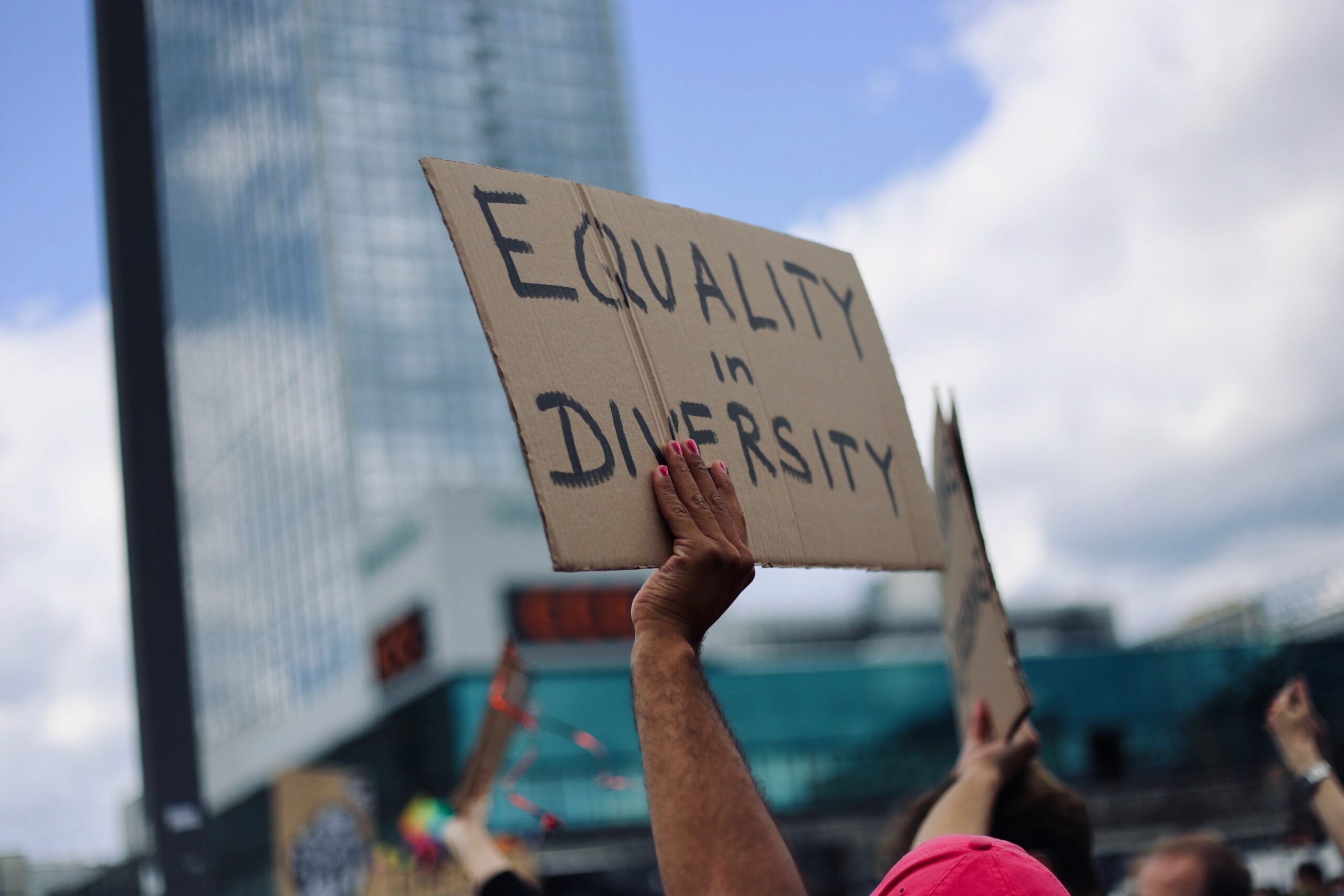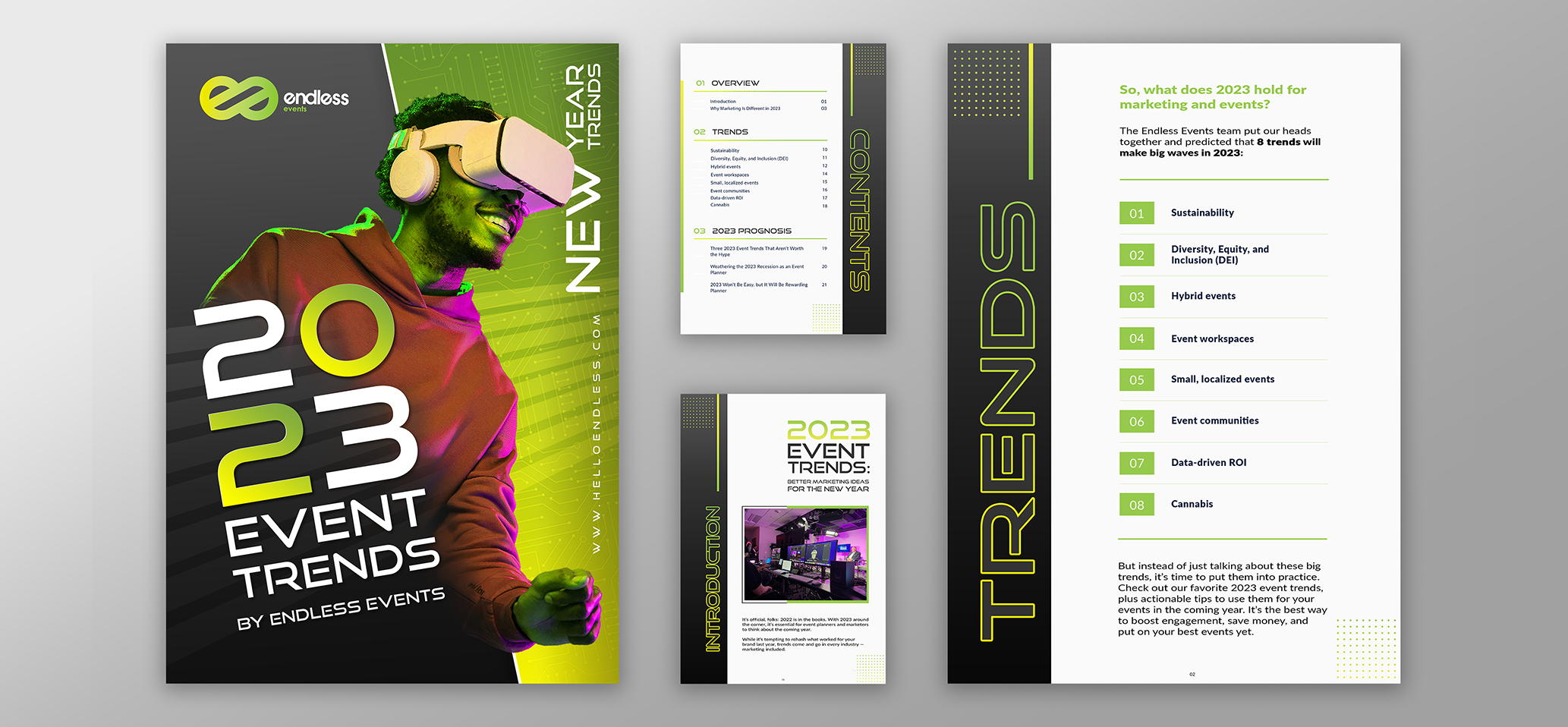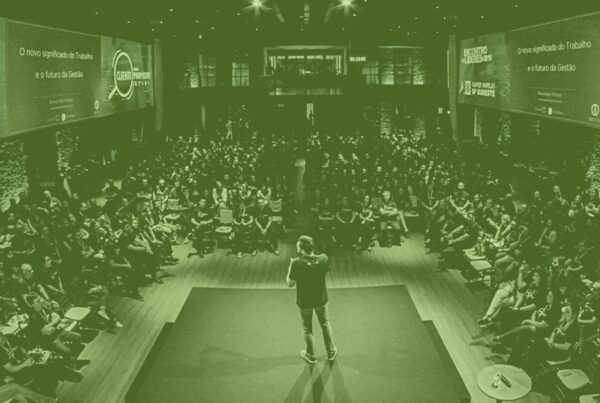2022 is in the books, folks. 2023 is a squeaky, shiny new year that promises brands plenty of opportunities (and a few challenges). So, what can we expect in the new year? Event planners need to know what’s on the radar for 2023, but don’t worry; we’ve got you covered. Endless Events’ 2023 Event Industry Trends Guide includes insights based on our years of experience in events and our team’s proprietary research into event trends.
Whether you’re an event planning veteran or this is your first rodeo, our ‘23 event planning guide is chock-full of surprising and helpful insights for the new year. Download the report now to see what you can expect for events in 2023.
First, you’ll get a breakdown of why the marketing landscape is different in 2023 — and no, it’s not just because of COVID. Next, we introduce eight trends that savvy event planners are embracing in 2023 and three that aren’t worth your time or attention this year.
The guide is free to download, but if you want a sneak peek, check out this overview guide to get a taste of what’s inside the guide.
2023 Event Trends Sneak Peek: What’s Inside?
Want a few spoilers? We predict these eight trends will be a big deal in 2023.
Eco-friendly Events
Being eco-friendly isn’t new. We get it. The issue is that event attendees expect eco-friendly events — and event planners still struggle to do them right. After nearly three years of disappointment and frustration, shouldn’t you keep your promises to attendees? If they want green events, you need to give ‘em green events.
You don’t have to consult Greenpeace for this, either. You can make events more eco-friendly by:
- Choosing reusable napkins over paper napkins.
- Hosting events in eco-friendly venues (look for LEED-certified buildings).
- Paying for carbon offsets.
- Setting up recycling bins throughout the venue.
- Providing refillable water bottle stations instead of plastic water bottles.
- Make meat-free and dairy-free catering options the rule, not the exception. You can still offer meat and dairy to attendees if they request it.
Diversity, Equity, and Inclusion
Inclusion is the name of the game in 2023. People of color, people with disabilities, and other marginalized groups need to feel welcome at your events. As an event planner, you have the power to make events more diverse, equal, and inclusive.
That means you need to set up a welcoming space where people can access the same information and feel like they’re a celebrated part of the community. This isn’t about doing lip service to DEI, either. Download the full 2023 Event Industry Trends Guide for actionable steps to make DEI a reality at all of your events.
 Hybrid Events
Hybrid Events
The world can’t agree on whether in-person or virtual events are better. Virtual events were a COVID-era necessity, but plenty of people are ready for in-person connections again. Fortunately, you don’t have to choose: hybrid events offer a happy medium.
With hybrid events, attendees can choose between attending in-person or online. You can host the event in a smaller (and cheaper) space, which is a bonus. You just need to hook up sound and audio to your event technology platform and share your content virtually. As long as virtual and in-person attendees get the same experience, hybrid events can be very effective.
Event Workspaces
It’s unlikely that event attendees will completely unplug from work to attend an in-person event. Work emails, Slack chats, and phone calls still happen while attendees are at an event, so why do event planners pretend that people don’t need to work?
Embrace the fact that busy professionals are at your event. Make it as comfortable as possible for attendees to work at your venue with event workspaces. They allow attendees to tackle work in a comfortable space with fewer distractions — no need to sit cross-legged on an expo hall floor with their laptops.
Local Events
Logically, it makes sense to host just one big event every year. You only have to book one venue and deal with one set of dates. Simple, right?
Maybe, but that isn’t on par with what we see for 2023. This year, companies are taking a different approach. Instead of hosting one big event, they’re hosting smaller events around the country. They’re taking their event on tour, bringing the event to attendees instead of asking attendees to come to a single major event.
The switch to local events is better for sustainability because attendees don’t have to travel as much. That makes it more affordable for attendees to go to your event, too: there’s no need to buy a cross-country plane ticket or a hotel if they can drive to a local event instead.
Yes, localized events have more moving parts, but they put your brand in front of more people. There are fewer barriers to attendees registering for your event, which can boost attendance and engagement in one fell swoop.
Communities
Small, local events allow you to connect with customers one-on-one. You only get to see your audience once a year and need to make an impression to move the needle. In 2023, more brands are investing in communities.
A community is an online space where your biggest fans can come together to network, access exclusive content, and score discounts. As a brand, it also gives you a place to gather information on your target audience. You can ask them for event feedback, product ideas, and more.
Just don’t use platforms like Facebook Groups. Facebook owns your audience, so it’s better to use an event technology platform like Endless for this. This way, you own the relationship if Facebook ever goes belly-up.
 Event Attribution
Event Attribution
We love the promise and hope that comes with the new year, but we must be realistic: 2023 will be tough, at least financially. According to Bloomberg, there’s a 100% chance of a recession in the next 12 months.
If you want to protect your budget this year, you need to prove that your events get results for the business. Instead of crossing your fingers and hoping that an event performed well, you need to use event technology to prove your worth in numbers.
URLs, codes, and website analytics can help prove that your events bring ROI. Your bosses are eager to cut costs, so data-driven attribution might save your event budget in 2023.
Cannabis (Yes, Cannabis)
We know, we know. This might sound like it’s coming out of left field, but cannabis is an up-and-coming trend for events across the U.S. — where cannabis is legal, of course. Gen Z and Millennial event attendees are increasingly ditching alcohol in favor of cannabis. So like it or not, your happy hours might look a little different this year.
Legally, you probably can’t provide cannabis at an event, but you can make your events more 420-friendly. Download our full guide to learn how your brand can navigate the intricacies of including cannabis in your events.
Make Plans for 2023 Right Now
This isn’t 2022. After taking a few weeks to decompress over the holidays, it’s time to put your game face on and dive headfirst into 2023. Trends come and go, but as you can see, 2023 is a different animal.
Event planning has always been challenging. The good news is that you’ve survived at least three apocalypses by now, so change isn’t new for you. Even so, you can embrace the trends in this 2023 guide to enjoy smoother sailing this year. Download your free copy of the 2023 Event Industry Trends Guide now to start the new year with a bang.








